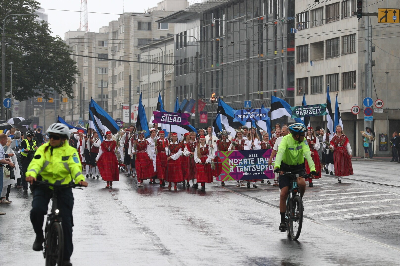
©
12 зупинок, понад 180 кілометрів і більше 2000 учасників — саме так пройшла по території Ляене-Вірумаа традиційна хода з вогнем до XXVIII пісенного та XXI танцювального свята Естонії "Iseoma". 30 червня вогонь був урочисто запалений у церкві Святого Миколая у Віру-Нігулі, після чого рушив через громади району, даруючи музичні виступи, хоровий спів і народні танці. Під час подорожі вогонь супроводжували місцеві оркестри, хорові колективи, танцювальні гурти та навіть дитячі колективи. Зокрема, у місті Ухтна відбулася зустріч із хором дітей та жінок, оркестром мандолін і танцювальним ансамблем старшого віку. У Раквере вогонь отримав привітання від музикантів та жителів, а потім шлях пролягав через Винні з трьома зупинками в Паяуцях, Роелі та Ляеквере. Найбільш масштабним був прийом у Віке-Маар’ї — тут урочистості зібрали близько 800 людей. Завершився маршрут у Пальмсе, де лунали виступи місцевих музикантів і танцюристів, а вогонь був урочисто внесений до місцевого палацу. Організатори відзначають, що цього року вогонь супроводжували різноманітні засоби — від авто і мотоциклів до коней, демонструючи різноманіття культурних форм. Усі події зібрали понад дві тисячі учасників і глядачів. Телевізійний канал ETV вже 3 липня покаже спеціальний випуск "Minu pidu. Tuletulemine", який розкриває кульмінаційний шлях вогню перед великим святом. Ця традиція, кажуть естонці, не просто про вогонь, це символ єдності, культури та живої спадщини, що поєднує тисячі людей по всій Естонії.
Підтримати видання або поширення саме цієї cтатті (вказати): номер корпоративної картки VISA 4874 24 25 0032 3434
Summer Flame of the Folk Festivals Lights Up Lääne-Viru County Step by Step
Twelve stops, over 180 kilometres, and more than 2,000 participants — this was the route of the traditional torch relay through Lääne-Viru County ahead of Estonia’s 28th Song Festival and 21st Dance Festival, known as "Iseoma." On 30 June, the flame was ceremoniously lit at St. Nicholas Church in Viru-Nigula before making its way through local communities, bringing music performances, choral singing, and folk dances along the journey. The flame’s procession was accompanied by local orchestras, choirs, dance groups, and even children’s ensembles. In the town of Uhtna, it was greeted with performances by children’s and women’s choirs, a mandolin orchestra, and a senior dance troupe. Upon reaching Rakvere, musicians and residents warmly welcomed the flame before it continued through Vinni parish, making stops in Pajutsi, Roela, and Laekvere. The largest reception took place in Väike-Maarja, where nearly 800 people gathered for celebrations. The route concluded at Palmse Manor, featuring performances by local musicians and dancers, where the flame was formally brought inside the historic estate. Organisers highlighted the diverse modes of transport that carried the flame this year — from cars and motorcycles to horses — showcasing a rich tapestry of cultural expressions. In total, the events attracted over 2,000 participants and spectators. On 3 July, the Estonian national broadcaster ETV will air a special programme, "Minu pidu. Tuletulemine" ("My Festival. The Coming of the Flame"), capturing the flame’s final journey ahead of the grand festival. For Estonians, this tradition is about much more than a flame — it symbolises unity, culture, and a living heritage that connects thousands across the country.
1486